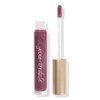Jane Iredale Hydropure Hyaluronic Acid Lip Gloss Versus Hourglass Cosmetics Phantom Volumizing Glossy Lip Balm
What's inside
What's inside
 Key Ingredients
Key Ingredients

 Benefits
Benefits

 Concerns
Concerns

 Ingredients Side-by-side
Ingredients Side-by-side

Hydrogenated Poly(C6-14 Olefin)
EmollientEthylhexyl Hydroxystearate
EmollientSimmondsia Chinensis Seed Oil
EmollientRicinus Communis Seed Oil
MaskingEthylene/Propylene/Styrene Copolymer
Silica
AbrasiveCopernicia Cerifera Wax
Stearyl Behenate
EmollientPolyhydroxystearic Acid
EmulsifyingCaprylic/Capric Triglyceride
MaskingEthylhexyl Palmitate
EmollientHydroxystearic Acid
CleansingButylene/Ethylene/Styrene Copolymer
Tribehenin
EmollientMangifera Indica Seed Butter
Skin ConditioningHydrolyzed Hyaluronic Acid
HumectantButyrospermum Parkii Butter
Skin ConditioningIsostearic Acid
CleansingVanilla Planifolia Fruit Extract
Skin ConditioningSorbitan Isostearate
EmulsifyingHydrogenated Vegetable Oil
EmollientPersea Gratissima Oil
Skin ConditioningLecithin
EmollientPolyglyceryl-3 Polyricinoleate
EmulsifyingPentaerythrityl Tetra-Di-T-Butyl Hydroxyhydrocinnamate
AntioxidantLactic Acid
BufferingPalmitoyl Tripeptide-1
Skin ConditioningStearoyl Glutamic Acid
CleansingMica
Cosmetic ColorantTitanium Dioxide
Cosmetic ColorantCI 77891
Cosmetic ColorantIron Oxides
CI 77491
Cosmetic ColorantCI 15850
Cosmetic ColorantCI 77492
Cosmetic ColorantHydrogenated Poly(C6-14 Olefin), Ethylhexyl Hydroxystearate, Simmondsia Chinensis Seed Oil, Ricinus Communis Seed Oil, Ethylene/Propylene/Styrene Copolymer, Silica, Copernicia Cerifera Wax, Stearyl Behenate, Polyhydroxystearic Acid, Caprylic/Capric Triglyceride, Ethylhexyl Palmitate, Hydroxystearic Acid, Butylene/Ethylene/Styrene Copolymer, Tribehenin, Mangifera Indica Seed Butter, Hydrolyzed Hyaluronic Acid, Butyrospermum Parkii Butter, Isostearic Acid, Vanilla Planifolia Fruit Extract, Sorbitan Isostearate, Hydrogenated Vegetable Oil, Persea Gratissima Oil, Lecithin, Polyglyceryl-3 Polyricinoleate, Pentaerythrityl Tetra-Di-T-Butyl Hydroxyhydrocinnamate, Lactic Acid, Palmitoyl Tripeptide-1, Stearoyl Glutamic Acid, Mica, Titanium Dioxide, CI 77891, Iron Oxides, CI 77491, CI 15850, CI 77492
Diisostearyl Malate
EmollientPhytosteryl/Isostearyl/Cetyl/Stearyl/Behenyl Dimer Dilinoleate
Skin ConditioningHydrogenated Polyisobutene
EmollientPolyglyceryl-2 Triisostearate
EmulsifyingBis-Diglyceryl Polyacyladipate-2
EmollientCeresin
Emulsion StabilisingMenthyl Lactate
MaskingMicrocrystalline Wax
Emulsion StabilisingAluminum Hydroxide
EmollientArgania Spinosa Kernel Oil
EmollientMangifera Indica Seed Butter
Skin ConditioningPersea Gratissima Oil
Skin ConditioningButyrospermum Parkii Butter
Skin ConditioningHydrogenated Vegetable Oil
EmollientTocopherol
AntioxidantCI 77491
Cosmetic ColorantCI 77891
Cosmetic ColorantCI 15850
Cosmetic ColorantCI 19140
Cosmetic ColorantCI 42090
Cosmetic ColorantDiisostearyl Malate, Phytosteryl/Isostearyl/Cetyl/Stearyl/Behenyl Dimer Dilinoleate, Hydrogenated Polyisobutene, Polyglyceryl-2 Triisostearate, Bis-Diglyceryl Polyacyladipate-2, Ceresin, Menthyl Lactate, Microcrystalline Wax, Aluminum Hydroxide, Argania Spinosa Kernel Oil, Mangifera Indica Seed Butter, Persea Gratissima Oil, Butyrospermum Parkii Butter, Hydrogenated Vegetable Oil, Tocopherol, CI 77491, CI 77891, CI 15850, CI 19140, CI 42090
Ingredients Explained
These ingredients are found in both products.
Ingredients higher up in an ingredient list are typically present in a larger amount.
This ingredient is also known as shea butter. It is an effective skin hydrator and emollient.
Emollients help soothe and soften your skin. It does this by creating a protective film on your skin. This barrier helps trap moisture and keeps your skin hydrated. Emollients may be effective at treating dry or itchy skin.
Shea butter is rich in antioxidants. Antioxidants help fight free-radicals, or molecules that may harm the body. It is also full of fatty acids including stearic acid and linoleic acid. These acids help replenish the skin and keep skin moisturized.
While Shea Butter has an SPF rating of about 3-4, it is not a sunscreen replacement.
Shea butter may not be fungal acne safe. We recommend speaking with a professional if you have any concerns.
Learn more about Butyrospermum Parkii ButterCi 15850 is the pigment color red. It is an azo dye and created synthetically.
Azo dyes need to be thoroughly purified before use. This allows them to be more stable and longer-lasting.
This ingredient is common in foundations, lipsticks, and blushes. This color is described as brown/orangey red.
It has many secondary names such as Red 6 and Red 7. According to a manufacturer, Red 6 usually contains aluminum.
Learn more about CI 15850Ci 77491 is also hydrated iron III oxide. It's sole purpose is to give a red/pink hue to products.
Iron III oxides are classified as inorganic chemicals for coloring.
Synthetically created Ci 77491 is considered safer than those naturally found. This is because the synthetically created version may contain less impurities. Iron oxides are generally non-toxic and non-allergenic.
Learn more about CI 77491Ci 77891 is a white pigment from Titanium dioxide. It is naturally found in minerals such as rutile and ilmenite.
It's main function is to add a white color to cosmetics. It can also be mixed with other colors to create different shades.
Ci 77891 is commonly found in sunscreens due to its ability to block UV rays.
Learn more about CI 77891Hydrogenated Vegetable Oil is created by adding hydrogen to vegetable oil in order to give it more stability. This process also raises the melting point of vegetable oil. In cosmetics, it is an emollient.
Emollients help soothe and soften the skin. They do this by creating a protective film on your skin. This barrier helps trap moisture and keeps your skin hydrated. Emollients may be effective at treating dry or itchy skin.
The term "Hydrogenated Vegetable Oil" is an umbrella term and can refer to a variety of vegetable oils and blends of: sunflower oil, soybean oil, olive oil, coconut oil, palm oil, and more.
Due to the differences in vegetables, the benefits may vary.
Learn more about Hydrogenated Vegetable OilMangifera Indica Seed Butter isn't fungal acne safe.
Persea Gratissima Oil is also known as avocado oil.
Avocado Oil has antioxidant properties. It is mostly made up of the glycerides of fatty acids. About 67% of these fatty acids is made up of oleic acid. Palmitic acid and linoleic acid are also present.
These fatty acids help hydrate and soften the skin. It may increase collagen content in the skin. Collagen helps keep your skin plump and firm. This ingredient helps reduce inflammation and has not shown to clog pores.
This ingredient may not be fungal-acne safe due to its high fatty acid content.
Avocados also have B vitamins, vitamin K, vitamin C, vitamin E, and potassium.
Learn more about Persea Gratissima Oil